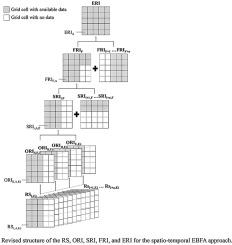当前位置:
X-MOL 学术
›
Ocean Coast Manage.
›
论文详情
Our official English website, www.x-mol.net, welcomes your
feedback! (Note: you will need to create a separate account there.)
Risk-based fisheries assessment considering spatio-temporal component for Korean waters
Ocean & Coastal Management ( IF 4.8 ) Pub Date : 2020-07-01 , DOI: 10.1016/j.ocecoaman.2020.105209 Hyuna Kim , Heejoong Kang , Chang-Ik Zhang , Young-Il Seo
Ocean & Coastal Management ( IF 4.8 ) Pub Date : 2020-07-01 , DOI: 10.1016/j.ocecoaman.2020.105209 Hyuna Kim , Heejoong Kang , Chang-Ik Zhang , Young-Il Seo

|
Abstract The existing EBFA (ecosystem-based fisheries assessment) approach assesses impacts of fisheries on sustainability, biodiversity, habitat, and socio-economic benefit, however, it does not account for spatial variations. In the current study, a spatial component was incorporated into the EBFA to better assess the following risk indices: risk score, objectives risk index, species risk index, fisheries risk index, and ecosystem risk index. To demonstrate, this extended approach was applied to the ecosystems of the East Sea and East China Sea. Since the existing EBFA produced a mean value of the overall ecosystem components, it was difficult to use the results as baseline data for spatial management. The extended EBFA—the approach using data for each index and sea block—enables an ecological risk assessment for each sea block. This approach is useful for setting intensive yet practical management measures that focus on indices and/or sea blocks with high risks, making good use of the results obtained from each sea block. The approach is particularly useful for introducing fishing ground closure, fishery resource area protection, marine area protection, and other management measures rooted in spatial management.
中文翻译:

考虑韩国水域时空成分的基于风险的渔业评估
摘要 现有的 EBFA(基于生态系统的渔业评估)方法评估渔业对可持续性、生物多样性、栖息地和社会经济效益的影响,但是,它没有考虑空间变化。在目前的研究中,EBFA 中纳入了空间成分以更好地评估以下风险指数:风险评分、目标风险指数、物种风险指数、渔业风险指数和生态系统风险指数。为了证明,这种扩展方法被应用于东海和东海的生态系统。由于现有的 EBFA 产生了整个生态系统组成部分的平均值,因此很难将结果用作空间管理的基线数据。扩展的 EBFA——使用每个指数和海块数据的方法——能够对每个海块进行生态风险评估。这种方法有助于制定集中而实用的管理措施,重点关注具有高风险的指数和/或海块,充分利用从每个海块获得的结果。该方法对于引入渔场关闭、渔业资源区保护、海域保护和其他植根于空间管理的管理措施特别有用。
更新日期:2020-07-01
中文翻译:

考虑韩国水域时空成分的基于风险的渔业评估
摘要 现有的 EBFA(基于生态系统的渔业评估)方法评估渔业对可持续性、生物多样性、栖息地和社会经济效益的影响,但是,它没有考虑空间变化。在目前的研究中,EBFA 中纳入了空间成分以更好地评估以下风险指数:风险评分、目标风险指数、物种风险指数、渔业风险指数和生态系统风险指数。为了证明,这种扩展方法被应用于东海和东海的生态系统。由于现有的 EBFA 产生了整个生态系统组成部分的平均值,因此很难将结果用作空间管理的基线数据。扩展的 EBFA——使用每个指数和海块数据的方法——能够对每个海块进行生态风险评估。这种方法有助于制定集中而实用的管理措施,重点关注具有高风险的指数和/或海块,充分利用从每个海块获得的结果。该方法对于引入渔场关闭、渔业资源区保护、海域保护和其他植根于空间管理的管理措施特别有用。









































 京公网安备 11010802027423号
京公网安备 11010802027423号